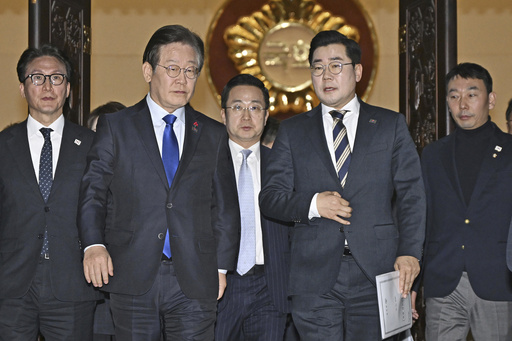SEOUL, South Korea — The National Assembly of South Korea took a significant step on Saturday by impeaching President Yoon Suk Yeol following his abrupt martial law decree, a move that concluded a period of political stalemate and ignited fervent discussions regarding Yoon’s future. Celebrations erupted among crowds who gathered to commemorate this moment as a fundamental victory for democracy in the country.
The impeachment motion was passed with a vote tally of 204 in favor and 85 against. With this decision, President Yoon’s official powers were suspended, leading to Prime Minister Han Duck-soo assuming the presidential responsibilities later that day. The Constitutional Court has a window of up to 180 days to decide whether to permanently dismiss Yoon or reinstate his powers. Should Yoon be removed from office, a new national election will be required within 60 days to appoint his successor.
This vote marked the second attempt to impeach Yoon, as lawmakers from the ruling party had previously abstained from voting during an earlier session. Nevertheless, increased public dissent and declining approval ratings prompted some members of the People Power Party to shift their stance and support the impeachment as protests gained momentum. National Assembly Speaker Woo Won Shik emphasized that the impeachment reflected the people’s strong yearning for democracy, courage, and commitment.
In the streets nearby, hundreds of thousands celebrated, waving banners and K-pop glow sticks, with one activist declaring, “We have preserved the constitutional order!” Protester Kim Su-bong voiced her satisfaction, expressing her belief that the impeachment resonated with the people’s wishes and urged for a swift decision regarding Yoon’s fate. In contrast, there were also demonstrations in favor of Yoon, though supporters quieted upon learning of the impeachment verdict.
Yoon released a statement pledging to remain steadfast and called upon officials to maintain the government’s stability during what he described as a “temporary” interruption of his presidency. He acknowledged the array of criticisms and encouragement he has received and vowed to work diligently for South Korea’s welfare until his role concludes. His declaration of martial law on December 3 was unprecedented in the past four decades; however, it was rescinded after just six hours due to a unanimous parliamentary vote against it, triggering a wave of political upheaval that impacted diplomatic relations and unsettled the financial markets.
As the acting leader, Han Duck-soo directed the military to enhance security measures in anticipation of any potential provocations from North Korea. He urged South Korean officials to reassure international partners that the nation’s major policies would remain unchanged and emphasized the need to mitigate any economic fallout from the political unrest. Han highlighted the vital importance of stabilizing government operations during this tumultuous period.
In a recent phone conversation, Han discussed the situation with U.S. President Joe Biden, addressing regional security issues including North Korea’s nuclear ambitions along with its collaboration with Russia. South Korea’s presidential authority primarily resides with the president, but the prime minister oversees the country when the president is incapacitated. Han’s extensive governmental experience includes positions as trade and finance minister, as well as serving as prime minister from 2007 to 2008.
The U.S. voiced its support for South Korea’s democratic frameworks, while Japan’s Prime Minister Shigeru Ishiba noted that Tokyo is observing developments closely but affirmed that relations between Japan and South Korea remain crucial. Following the declaration of martial law, Yoon mobilized a considerable number of troops and police officers to the National Assembly to prevent the vote on his decree; however, they retreated after the parliament voted against it, with no significant violence reported.
Opposition groups have accused Yoon of staging a rebellion, claiming that his actions contravene constitutional provisions that restrict martial law declarations to emergencies such as wartime. Allegations in the impeachment motion described that Yoon’s actions “committed rebellion that hurt peace in the Republic of Korea” due to the military and police mobilization surrounding the assembly. Yoon firmly refuted these accusations, arguing that his martial law declaration was an essential act of governance aimed to restore order and serve as a warning to the opposition Democratic Party, which he called an “anti-state force” undermining government stability.
Democratic Party leader Lee Jae-myung characterized Yoon’s rhetoric as a reckless act of aggression against the populace. Analysts suggest that Yoon appears to be preparing legal defenses for the martial law decree in the Constitutional Court, despite surveys indicating that over 70% of citizens support his impeachment. Recent polls have shown Yoon’s approval rating plummeting to a mere 11%, the lowest since he took office in 2022.
Conflicting narratives have emerged about the military responses to Yoon’s orders, particularly from military leaders who were tasked with executing those commands. Kwak Jong-keun, the commander of the Army Special Warfare Command, recounted that Yoon instructed his troops to forcibly remove lawmakers, though Kwak did not comply with the command.
Yoon becomes the third South Korean president to face impeachment during their term; a similar fate befell Park Geun-hye in 2016 over corruption allegations, while Roh Moo-hyun faced impeachment in 2004, which was subsequently overturned. Currently, Yoon cannot leave South Korea, and top officials including his defense minister and police chief have been arrested in connection with the martial law enactment. While Yoon enjoys presidential immunity from most criminal charges, this does not extend to accusations of rebellion or treason, and experts doubt that he will be forcibly detained due to concerns about potential confrontations with his security detail.




